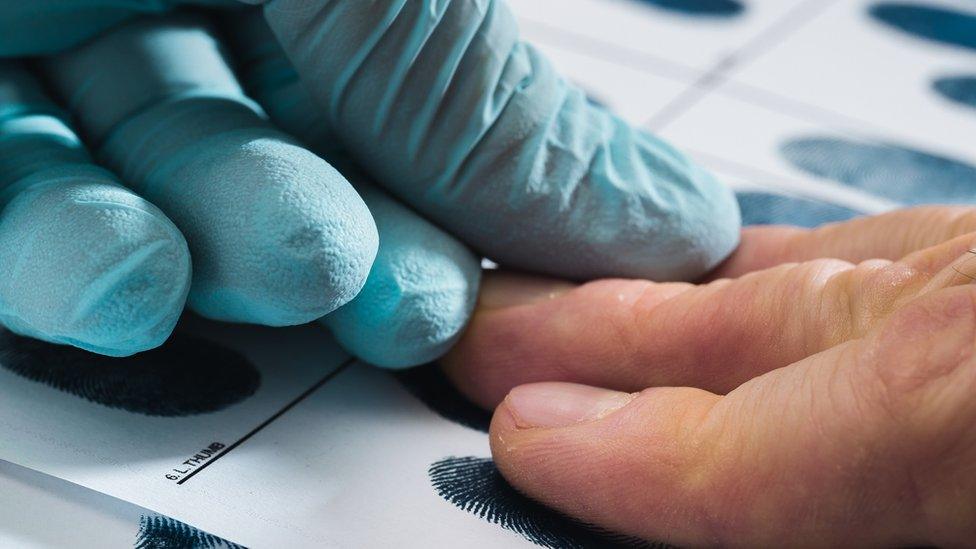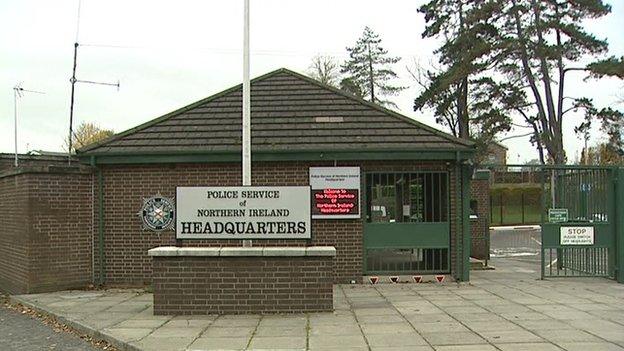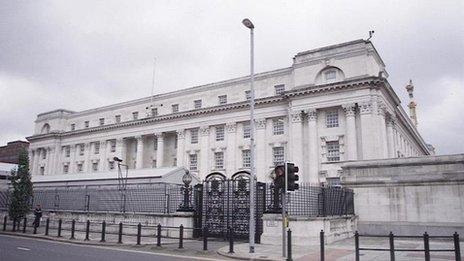PSNI data: European court rules ID policy breaches human rights
- Published

The PSNI retains convicted offenders' fingerprints, photos and DNA profiles
The indefinite storage of a convicted drink driver's DNA profile, photo and fingerprints by police is a breach of human rights, the European Court of Human Rights has ruled.
The ruling follows a decade-long legal battle by Fergus Gaughran against the Police Service of Northern Ireland.
Mr Gaughran, from Newry, was convicted in 2008, but challenged the PSNI's policy of keeping offenders' ID data.
The ruling said a lack of safeguards in the data policy had been "decisive".
Time limit
Mr Gaughran, who is now in his 40s, pleaded guilty to driving with excess alcohol after he was stopped by PSNI officers near Camlough, Country Armagh, in October 2008.
The County Down man was banned from driving for a year and his conviction was spent in 2013.
His long-running legal battle was based on his argument that the PSNI's blanket policy of storing all convicts' biometric data indefinitely was a breach of his right to privacy and took no account of the seriousness of his offence.
He began a test case in the UK courts in 2009, but it was dismissed by the High Court in Belfast in 2012 and again by the Supreme Court in 2015.
Mr Gaughran then took his case to the European Court of Human Rights and, on Thursday, he won a unanimous judgement that his rights had been breached, external.
The seven judges agreed that the PSNI's decision to retain Mr Gaughran's personal data indefinitely was a "violation" of Article 8 (right to respect for private and family life) of the European Convention on Human Rights.
They said Mr Gaughran's biometric data and photographs had been retained "without reference to the seriousness of his offence and without regard to any continuing need to retain that data indefinitely".
The court noted that the UK is one of the few Council of Europe jurisdictions which permits the indefinite retention of DNA profiles.
The majority of member states which use the European Court of Human Rights put a time limit on storing offenders' biometric data.
'Obscure powers'
The judges ruled that "having chosen to allocate itself the most extensive power of indefinite retention", the UK had a responsibility "to ensure that certain safeguards were present and effective".
In previous human rights cases, people who were acquitted of an offence have successfully challenged the lawfulness of keeping their data indefinitely.
Mr Gaughran's case is significant as he admitted his crime and was convicted.
During his arrest by the PSNI in October 2008, he provided a breath sample, which tested positive for excess alcohol.
The PSNI also took his fingerprints, his photograph and a DNA sample, in the form of a mouth swab.
The following month, Mr Gaughran pleaded guilty to driving with excess alcohol, was fined and served a one-year driving ban.
His decade long legal battle against the PSNI started in Belfast in 2009, when he asked for a judicial review of their policy of retaining identity data for an indefinite period.
Drink-driving convictions are spent within five years in the UK.
Facial mapping
Mr Gaughran's conviction was spent in 2013 and his physical DNA sample was destroyed at his request in 2015.
However, the PSNI has kept hold his digital DNA profile. along with his photo and fingerprints.
Thursday's ruling emphasised the importance of examining privacy rights "where the powers vested in the state were obscure and where the technology available was continually becoming more sophisticated".
The judges gave the example of facial mapping technology which had "already moved on" since Mr Gaughran's case was examined by the UK courts.
They also pointed out that the PSNI were only empowered to delete biometric data and photographs "in exceptional circumstances".
The effectively meant that Mr Gaughran could not request a review of the retention of his data, as there was "no provision permitting deletion if conserving the data no longer appeared necessary in view of the nature of his offence, his age, or the time that had elapsed and his current personality".
Thursday's ruling was welcomed by the Northern Ireland Human Rights Commission.
Its chief commissioner Les Allamby said his organisation has "engaged extensively and productively with the Police Service of Northern Ireland towards publishing a clear and public policy on the retention of biometric material, including provision for review".
"The policy will have to take on board the judgment as soon as possible," he added.
- Published13 May 2015

- Published13 November 2012
